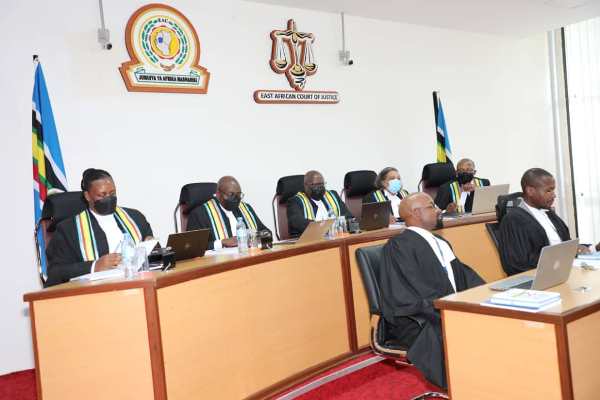
The Appellate Division resumes Sessions this week and heard Court hears Appeal No. 10 of 2020 Attorney General of Rwanda vs Union Trade Center Limited (UTC).
The Appellant (AG Rwanda) is challenging a decision of the Trial Court allowing and granting orders sought in Reference No. 10 of 2013 Union Trade Center Ltd vs AG of Rwanda and 3 others faulting the Government of Rwanda for taking over the mall as abandoned property.
At the hearing, the AG represented by Counsel Nicholas Ntarugera submitted that, the First Instance Division erred in law to rule that the Reference was filed on time. He contended that the cause of action arose on 29th July 2013 not on 2nd October 2013. Counsel also argued that the UTC legal representation in the matter was illegal. That there was no resolution on the appointment of the Advocates appearing in this matter as provided under Rule 19 (5).
Further that the Advocates (Francis Gimara and Hannington Amol) who are representing the UTC were not appointed by the Company rather they were appointed by Mr Tribert Rujugiro Ayabatwa who is a majority shareholder in the company. Counsel Nicholas submitted that this is procedural irregularities and asked Court to overturn the decision of the First Instance Division.
Principal State Attorney Mr Ntwali Emile also representing AG of Rwanda submitted that the Government has an obligation to manage the abandoned property especially for the citizens who are not in the Country and that when Rujugiro returns back he will receive his property.
The Interveners represented by Ms Molly Rwigamba contented that at the Trial Court they were denied an opportunity to support the AG Rwanda through their Statement that was rejected which she said it was a violation of Article 40 of the Treaty which allows the Interveners to provide evidence supporting in a case.
The Respondent represented by Counsel Francis Gimara and Hannington Amol counter argued that the Trial Court did not err in their judgment to order that the Reference was file on time because the cause of action arose when UTC learned that the mall was taken over by the letter of 2nd October, 2013.
Regarding his representation of UTC in court, Mr. Gimara stated that his representation of UTC is not illegal under Rule 19 (5) because this rule is about the appearance, and him as practicing law, he has the right to appear to court.
As to the locus standi of UTC, he argued that UTC has the lucus standi since it is company duly incorporated in a partner state as shown on the registration certificate of UTC. Also contended that the liquidation issue was not argued in the Trial Court.
Counsel Hannington Amol presented the UTC’s grounds of cross-appeal at length. With figures and precedents, he argued that the trial court erred in law in not ordering the return of the rental proceeds and the mall to UTC, and did not award a fair and equitable compensation to UTC. The Lawyers for the Respondent asked Court to uphold the decision of the First Instance Division dismiss the Appeal with costs to the Respondent and allow the Cross appeal.
The Court will deliver the Judgment on notice.
The three weeks session will go on up to 28th February and only thirteen (13) matters will be handled and these include; 7 Hearings, 3 Scheduling conferences, 2 Arbitration rulings and 1 Judgment to be delivered.
The matters will be brought before Honourable Justices of the Appellate Division: Nestor Kayobera (President), Geoffrey Kiryabwire (Vice President), Lady Justice,Sauda Mjasiri, Anita Mugeni and Justice Kathurima M’Inoti.
Rule 19 (5) provides that; A corporation or a company may appear by its director, manager or Company Secretary, who is appointed by a resolution under the seal of the corporation or the company or may be represented by an advocate.
The East African Court of Justice (EACJ or ‘the Court’), is one of the organs of the East African Community established under Article 9 of the Treaty for the Establishment of the East African Community. Established in November 2001, the Court’s major responsibility is to ensure the adherence to law in the interpretation and application of and compliance with the EAC Treaty.
Arusha is the temporary seat of the Court until the Summit determines its permanent seat. The Court’s sub-registries are located in the respective National Courts in the Partner States. (End)
